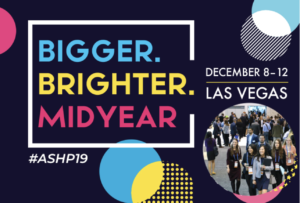“What You Learn in Vegas Should Not Stay in Vegas”
 The 54th ASHP Midyear Clinical Meeting was held at the Mandalay Bay Convention Center in Las Vegas last month. The meeting motto “Bigger and Brighter” was very appropriate for the largest gathering of health system pharmacists, each leaving more knowledgeable than when they arrived. There were several recurring themes for the meeting that I would like to share with those who were unable to attend and highlight for those who were.
The 54th ASHP Midyear Clinical Meeting was held at the Mandalay Bay Convention Center in Las Vegas last month. The meeting motto “Bigger and Brighter” was very appropriate for the largest gathering of health system pharmacists, each leaving more knowledgeable than when they arrived. There were several recurring themes for the meeting that I would like to share with those who were unable to attend and highlight for those who were.
 Antimicrobial Stewardship Programs (ASP)
Antimicrobial Stewardship Programs (ASP)
With the new CMS Conditions of Participation requiring hospitals to implement an ASP taking effect in March 2020, there were numerous presentations during the Midyear meeting on how to establish a stewardship program. The new standards require the direct involvement of pharmacists in the monitoring of patients receiving antibiotics and in the leadership of the program. In order to maximize the effectiveness of an ASP, pharmacists will need access to information technology that provides extensive patient clinical and surveillance data.
Several clinical system vendors, including PipelineRx, were providing demos of their ASP systems in the exhibit hall. The systems are designed to present the ASP pharmacist with pertinent lab data, current guidelines, dosing information and reminders regarding patient follow-up and counseling, as well as reporting to help identify opportunities to educate prescribers.
In addition to offering information systems, some vendors, such as PipelineRx, provide clinical pharmacy staffing resources. These clinical pharmacists can provide the actual ASP services on behalf of a facility or can provide standard remote medication order verification in order to free up the onsite staff to dedicate more time in the completion of ASP activities.
 Transitions of Care
Transitions of Care
Another area of focus at this year’s Midyear meeting was transitions of care and discharge management. As the publication of supporting data continues to expand, organizations across the country have developed a variety of different models to facilitate the discharge process. The common goals are to improve patient outcomes and prevent hospital readmissions.
There were several common challenges described during presentations at the meeting. One of the issues faced by the pharmacists providing patient discharge counseling is the identification of patients who are at the greatest risk of readmission. Second, pharmacists also need comprehensive patient medication data in order to complete the reconciliation of all medications the patient was taking during and prior to their hospital admission. Finally, a system is needed that will notify pharmacists when patients are being discharged and provide reminders to pharmacists to follow-up with patients at designated intervals following discharge.
Through integration with both inpatient EHR systems and outpatient patient medication databases, systems such as the PipelineRx Patient Discharge solution are designed to facilitate the discharge management process for pharmacists. Utilized in conjunction with the knowledge and skills of a clinical pharmacist, these systems can greatly enhance medication therapy compliance, improve patient outcomes, and reduce readmissions.
 Regulatory Compliance
Regulatory Compliance
Although the “official” effective date for the USP <800> and the revised USP <797> and <795> standards has been delayed to complete an appeals process, the topic of regulatory compliance was discussed extensively during the Midyear meeting. Many of our colleagues are still uncertain on exactly what will be required of their facilities to assure full compliance with the new standards, especially those in USP <800>.
I was able to attend several presentations in Las Vegas that helped address some of these issues. One of the very informative sessions was titled “Hazardous Drug Alert! NIOSH Handling and EPA Waste Updates for 2019”. Jerald Ovesen from CDC-NIOSH and Charlotte Smith from PharmEcology did a wonderful job of presenting the latest information regarding the rules related to the disposal of hazardous drugs and how to comply with the EPA requirements.
Another very informative session was presented by several pharmacy leaders including Eric Kastango, President and CEO of Clinical IQ, regarding the environmental quality and control measures that are required under the new USP <800> standards. The focus of the presentation was on practical solutions that can be employed by healthcare facilities to comply with the surface monitoring requirements and environmental controls included in USP <800>. Although these monitoring and testing procedures will put new demands on hospital pharmacy leadership, the information shared by Mr. Kastango and his colleagues was very helpful.
Overall, the ASHP Midyear Meeting was a great success. Beginning with the inspirational keynote address delivered by former Secretary of State Condoleezza Rice and continuing with many informative presentations and professional posters throughout the week, the meeting met all my expectations once again this year.
As always, the meeting was a wonderful opportunity to reconnect with friends and colleagues, and share ideas regarding many of the issues facing hospital and health system pharmacists. However, the most significant benefit of the meeting was hearing and learning about many of the cutting edge techniques and technologies that are being developed and utilized in pharmacy practice around the world. I left the meeting refreshed, inspired and energized with a renewed hope for the profession of pharmacy as we begin a new decade in healthcare with ever expanding roles for pharmacists and pharmacy technicians.
Kevin Jones, RPh, MBA, is VP of Pharmacy Services at PipelineRx. He has over 30 years of experience as a pharmacist and pharmacy manager in the hospital, institutional and home care settings, including serving as a Director of Pharmacy.

